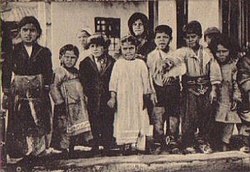Roma in the Republic of Macedonia

Macedonian Romani children (around 1900)
|
|
| Total population | |
|---|---|
| (53 879 (2002 census) 80 000 to 260 000 (Unofficial estimations)) |
|
| Languages | |
| Romani (Balkan Romani) and Macedonian | |
| Religion | |
| Sunni Islam |
According to the last census from 2002, there were 53 879 people counted as Romani in the Republic of Macedonia, or 2.66% of the population. Another 3 843 people have been counted as "Egyptians" (0.2%). Altogether, 2.85% Romani and Egyptians have been registered in Macedonia.
Other sources claim the number to be between 80 000 and 260 000 Roma in Macedonia or approximately 4 to 12% of the total population.
The municipality of Šuto Orizari is the only municipality in the world with a Romani majority and the only municipality where Romani is an official language. Due to the demographics, both Romani and Macedonian are official in Šuto Orizari, the municipality being officially bilingual. The mayor of the municipality, Elvis Bajram, is an ethnic Roma.
In 2009, the Government of the Republic of Macedonia took measures to enlarge inclusion of Romani in the education process.
The Republic of Macedonia is the region's leader in respecting the rights of the Romani people. It is the first country in the region with a minister of Romani ethnicity and also has a lot of Romani in high government positions. However, there is still a lot to be done concerning the education and integration of the Romani.
The Romani people originate from Northern India, presumably from the northwestern Indian states Rajasthan and Punjab.
The linguistic evidence has indisputably shown that roots of Romani language lie in India: the language has grammatical characteristics of Indian languages and shares with them a big part of the basic lexicon, for example, body parts or daily routines.
More exactly, Romani shares the basic lexicon with Hindi and Punjabi. It shares many phonetic features with Marwari, while its grammar is closest to Bengali.
...
Wikipedia
